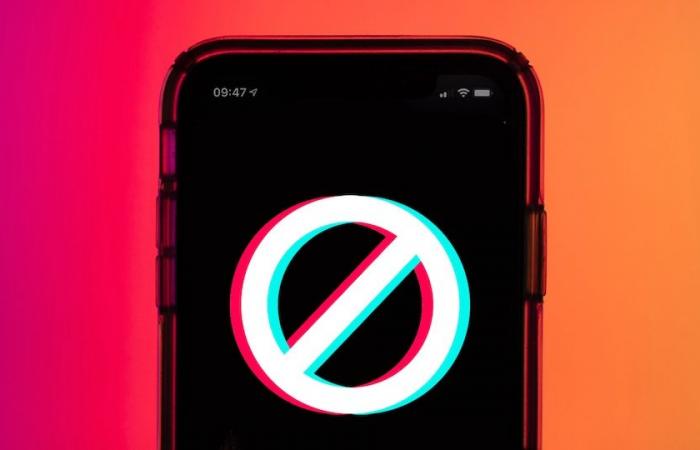The subject had almost become a journalist’s chestnut. Every year, since 2019, the American public authorities have brought up the possibility of banning TikTok on their territory on the grounds that the Chinese application constitutes “ a threat to the national security of country “. But every year… the attempt failed. The fault, pell-mell, for the consequences that such a decision could have on the relations, already tense, between the two countries, for the important economic interests for the United States in keeping the application or even for an electoral agenda not very favorable to such a decision.
In November 2020, when its ban had even been approved by the Trump administration a few months earlier, the United States Department of Commerce, responsible for managing trade and industry at the federal level, created the surprise by postponing the ban for an indefinite period… only two days before the date that was planned for its activation. A decision which almost seemed to definitively bury this case, even if at the time it only evoked a “ [sursis] pending further legal developments ».
A debate that really became one
But in 2024, fears that the Chinese government could manipulate content published on the platform or even use it as a tool of disinformation have gained weight. As a reminder, TikTok belongs to the company ByteDance, accused by several Western governments of being a Trojan horse of the Chinese government. In April 2024, the US Congress adopted by a large majority a bipartisan law to permanently ban the social network unless it was sold before January 19 to a buyer approved by the government. Understand… especially not Chinese.
« As much for the national security of the country as to avoid possible attempts to manipulate the population, the subject of a ban on TikTok is very real across the Atlantic », concedes Quentin Bordage, founder and CEO of the Kolsquare platform, dedicated to influencer marketing. “ Especially since other countries, such as India or Pakistan, have already made a similar decision, without mentioning the United Kingdom which chose to ban its use on government devices in 2023 or the European Parliament who made the same decision last year regarding its officials ».
To justify this decision – which some observers consider to be solely liberticidal – the legislators invoked an arsenal of Chinese legislation which allows the government to secretly request data from Chinese companies and citizens for intelligence collection operations. Others assert for their part that “ TikTok has helped spread anti-Semitism since the start of the war between Israel and Hamas and during the presidential election », as summarized by the New York Times in its January 10 edition. Of course, the leaders of TikTok completely deny these accusations and denounce an attempt to “ censorship of the American people ».
French designers and brands take notes
Concretely, this ban would not directly target users but rather the portals which allow applications to be downloaded – hello App Store – by inflicting economic sanctions on them if they continued to distribute TikTok. Much more than a simple legal decision taken across the Atlantic, this legal battle could give ideas to European and French legislators, an eventuality for which our Creator Economy must willingly prepare despite.
« You should know that TikTok is today the second network for marketing influence behind Instagram », explains Quentin Bordage. “ So it’s a real subject for actors like us who have technologies, or for advertisers and creators who invest their time and energy in the objective of developing audiences and finding editorial and commercial mechanisms that work. Just to give you some indications: in France, there are 137,000 influencers who have more than 5,000 followers on TikTok, and at least 30% of their audience in France. At European level, there are around 550,000 ».
One thing is certain, according to him, is that the French market anticipates the worst scenarios: “ Today, creators are present on several platforms to achieve a better balance between their main income and their additional income. Just like brands when investing “. This need to diversify did not wait for the specter of a ban on TikTok to be assimilated by creators. The fact that platforms regularly modify their algorithms, and thus put “ creators at risk », adds Quentin Bordage, by constantly redefining the type of content that can become viral or not, has a lot to do with it.
Who will get the lion’s share?
To return across the Atlantic, other applications have already taken advantage of TikTok’s setbacks. The Instagram Reels and YouTube Shorts sections, directly inspired by TikTok by promoting short content, are already identified as natural destinations for both users and American creators if there is a ban. To be more precise, the eMarketer site recently detailed that Instagram would appropriate 22.2% of advertising spending previously allocated to TikTok, Facebook 17.1% and YouTube 10.7%. Connected television manufacturers – a fact that sheds new light on our article yesterday –, broadcasters and digital media companies would compete for an amount around 30% while the remaining “crumbs” would then be shared between Snapchat, Pinterest and X.
-“TikTok refugees,” as some Uncle Sam creators describe themselves – a somewhat dubious characterization when you consider its political meaning – have even started migrating to a brand new Chinese app – chase the natural, he comes back at a gallop – called Xiaohongshu, for “Little Red Book” in Mandarin, quickly nicknamed “RedNote” by Westerners. This platform, which strongly resembles Instagram, is now number 1 in downloads in the United States on the Apple Store. A success that is also proven by the number of tutorials that have appeared on the internet in recent days to learn Mandarin, the application being currently only available in the language of Fan Bing Bing – a famous actress from the Chinese Empire. Medium -.
Whatever happens this Sunday, audiences are not going to disappear. You just have to anticipate where they are going go,” adds Quentin Bordage. Especially since we are never safe from a spectacular turnaround.
A “happy” ending?
Already because the leaders of Bytedance could find a buyer by Sunday – if that is really their wish –. Several potential profiles have already been put forward: Elon Musk, for example, would have been proposed as an option by ByteDance, as reported by the press this Monday. A sale which, however, has little chance of succeeding, already because it would pose problems from an antitrust point of view – Elon Musk is already the owner of of ” pure fiction ».
The group of billionaire Frank McCourt – known in France as the owner of Olympique de Marseille – has presented an official offer valuing TikTok’s American activities, not including its algorithm, at $20 billion. No response yet. The other names mentioned are those of Bobby Kotick, former CEO of Activision Blizzard, who would have notably approached Sam Altman, the CEO of OpenAi, to make him his partner, Doug McMillon, the CEO of Walmart and Microsoft, another door to exit which would pose problems from a legal point of view.
Finally, banning could also be avoided by a political decision. There is no shortage of elements to claim it, as Quentin Bordage explains: “ In the United States, the debate is a little more lively than in other countries because TikTok has been deploying its TikTok Shop marketplace there since 2023, which supports a whole bunch of VSEs and SMEs “. Banning the application could therefore leave a multitude of online businesses in the lurch.
Donald Trump as interested rescuer?
Without forgetting that Donald Trump, one of the fiercest opponents of TikTok, just four years ago, as we mentioned at the start of the article, has since shown itself by a spectacular about-face on the issue. He went so far as to call TikTok the only tool capable “ to promote freedom d’expression » at the end of 2024. No one is fooled, especially not Geoff Garin, a Democratic strategist quoted in a New York Times article: “ It’s hard to believe that Trump’s turnaround on TikTok has to do with anything other than the influence of a billionaire donor and Trump’s reluctance to give up his access to his followers on the platform “, referring to Jeff Yass, a Republican mega donor who owns a significant stake in ByteDance.
« As with almost everything Trump does, his change in position is driven by self-interest, not principle or national interest », he concludes. Whatever his motivations, Donald Trump will have to hurry or rather create the impossible if he wants to nip this court decision in the bud. His inauguration is scheduled for next Monday, one day AFTER the scheduled ban from TikTok. In politics as on the networks, time is money…






